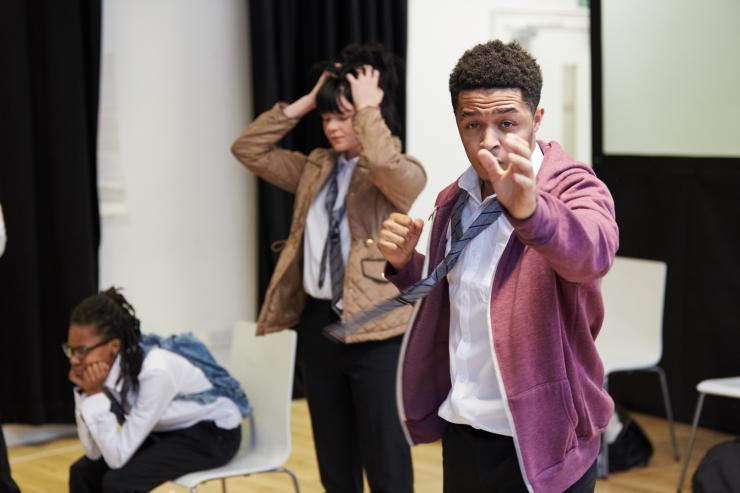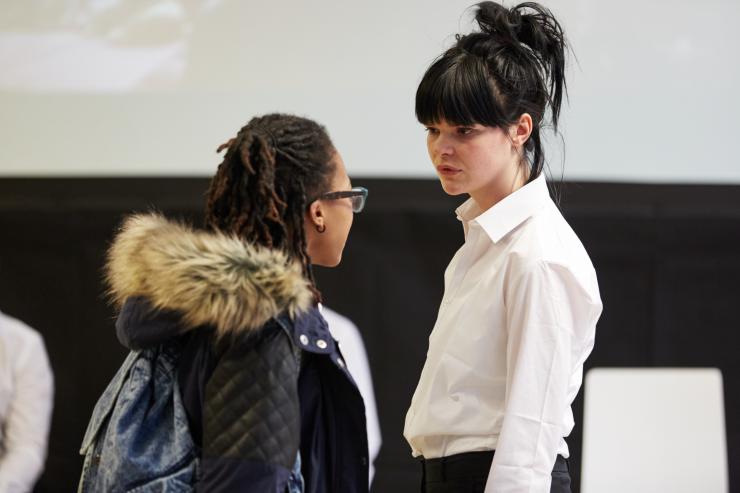Meta
A Quiet Theatrical Revolution
Cardboard Citizens do their theatre a different way. Go see one of their shows, most likely touring in the UK in schools, prisons, or taking place on the country’s streets that are increasingly populated by growing numbers of homeless people and you will see what I mean. Sprung from the Bullring Roundabout in Waterloo in London, a cardboard city for the homeless between 1983 and 1998 and where the BFI IMAX now stands, the first members of the company were rent boys, rough sleepers, drinkers, and transvestites. In time, the group has gone on to pioneer the use of theatre and participatory arts to engage with the homeless and spread its messages of inclusion and hope to wider audiences. Their most recent offering, Meta, is no exception.
For shows like Meta to be embraced by the mainstream and to be seen as important theatre would be the real revolution, the real activism, and the beginning of true social change.
Recently, there’s been much debate in the UK around theatre and social cause. At the Guardian and Battersea Arts Centre’s A Nation’s Theatre series in Cardiff, also part of National Theatre Wales’s Big Democracy Project, theatre critic Lyn Gardner posed the question: Can theatre be an effective form of activism? The question might seem slightly rhetorical because, generally speaking, all theatre is an activism (with a small and big “a”). All theatre activates thoughts, feelings, catharsis, discussion, actions, and even epiphanies, whether it is Bertolt Brecht or Arthur Miller, even if it isn’t with a big “A,” prompting people to “man the barricades.”
But can theatre affect social change? Social change can’t happen without its partner, activism, and there are few theatre companies in the UK who intentionally plant the seeds for thought and action to occur, although Cardboard Citizens could count themselves as one of them. Meta is activism, albeit on a small “a” personal level. Through practicing Augusto Boal’s “Theatre of the Oppressed,” Cardboard Citizens invite audiences to feel, see, and understand the connection between the events on stage and one’s own, often unconscious, thought patterns, unchallenged beliefs, and behavior.

But experiencing Meta is no ordinary theatrical night out. It’s not “Attend the play and decamp to the bar for a beer and then go home.” First we watch exposition on how adolescent brain development profoundly affects teenagers’ thoughts and decision making skills. Next, we watch parts of this same exposition again, this time with audience members acting out their ideas to show how scenes could have more positive outcomes. In other words, Forum Theatre. Meta is pure “spec-actor” art, to borrow Boal’s famous term. It is also a gentle assault on traditional theatre, traditional forms of catharsis giving, and use of space.
But I’m a mostly traditional theatregoer, in the sense that I like to sit down and watch seemingly passively. So I was attending my first Cardboard Citizens show with equal parts excitement and trepidation. The cast of Meta was comprised of members of the Act Now youth ensemble, sixteen to twenty-five year-olds who are not in education, employment or training (NEET), or have experienced homelessness. As I walked into the theatre space at Hackney Showrooms, the four actors sat on a bare stage as if in a school assembly. Behind them ran a backdrop of video projections emblematic of social media’s dominant role in our lives, appropriate as the show explores how a social media prank can derail lives.
The introduction, given by director Tony McBride, provided the show’s context and explained that meta means “beyond cognition.” So far so good. Yet, I couldn’t help thinking, do I want all this? Do I need to see the show’s entrails and learn how it was put together, and know that the playwright, Sarah Woods, was advised by a team of Cognitive Neuroscientists from London’s top universities? Well, as it turns out, yes, if I was to embrace the kind of audience participation this show demands.
Meta was the most enjoyable and at its most meaningful when scenes were worked through with audience intervention.
Describing the experience to many of my theatregoing colleagues later, some expressed dismay. However, by this time I was elated because the process was revelatory. Not only did I learn something about the brain and was able to apply what I had learnt in my own personal development process, not only were the young actors stunningly talented and intelligent and on fire, not only was Sarah Woods’ writing a little like, at times, watching a Ken Loach film onstage, the play was also the most enjoyable and at its most meaningful when scenes were worked through with audience intervention. Although the play has mostly been toured around schools specifically for that audience range, I would suggest that the adults that night were also empowered: not only were they able to spot where an adult character could have done better, they were able to understand why she did not and, crucially, demonstrate compassion for her. It is important to note that the debate between audience members and the creative team was lively, particularly over the actions of the distraught, over worked single mom, which prompted conflicting opinions.

At the aforementioned A Nation’s Theatre event, Battersea Arts Centre Artistic Director David Jubb stated, “Theatres over serve the most advantaged people in this country and risk becoming irrelevant to the many, in the favor of the few.” This is not to say that all “mainstream” theatre is perfunctory or that theatres are and should be dictating the kind of medicine its advantaged audiences swallow, but it should be to say that work by theatres such as Cardboard Citizens would stimulate, excite, anger and provoke all involved, and should be seen in our mainstream theatres.
Can and why shouldn’t world renowned theatres embrace these kinds of quiet revolutions, or model this kind of work? Doing so would make them more inclusive power house change makers. For shows like Meta to be embraced by the mainstream and to be seen as important theatre would be the real revolution, the real activism, and the beginning of true social change.









Comments
The article is just the start of the conversation—we want to know what you think about this subject, too! HowlRound is a space for knowledge-sharing, and we welcome spirited, thoughtful, and on-topic dialogue. Find our full comments policy here